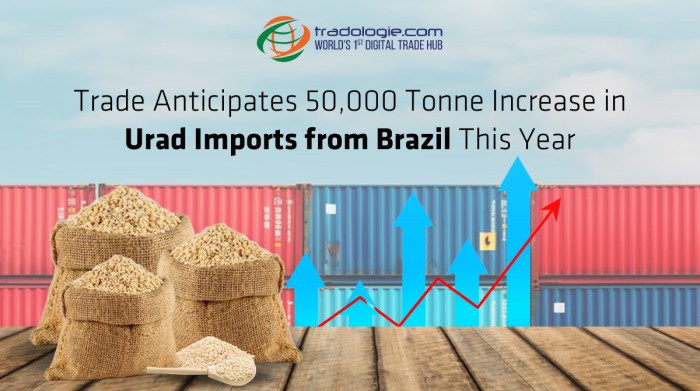 info@tradologie.com
info@tradologie.com
 +91 85959 57412
+91 85959 57412
 info@tradologie.com
info@tradologie.com
 +91 85959 57412
+91 85959 57412
India, which is the world's biggest consumer of pulses, anticipates a rise in import from those nations as countries like Argentina and Brazil begin to increase the amount of land planted to urad or black matpe. Currently, India's primary source of urad comes from Myanmar. Pulses are already being grown in Brazil.
We anticipate receiving at least 50,000 tonnes of black matpe from Brazil between June and July of this year, according to Bimal Kothari, Chairman of the India Pulses and Grains Association (IPGA), the leading trade association for the industry. According to him, Brazil supplied about 5,000 tonnes of urad last year. Kothari recently led an IPGA group to Brazil. He remarked, “We told them that India is an enormous market and that they ought to attempt to grow pulses.”
Pulses producers and pulses sellers can easily get the best price on the platform if they sell pulses in bulk while buyers can buy pulses in bulk from vendors across the globe.
India's Urad Imports Surge Amid Domestic Shortfall and Weather Woes
Because of a shortage of domestic supplies and unpredictable weather that affected both the rabi and kharif harvests, India's urad imports increased in 2023–2024. As per Igrain India, there was a 19% rise in urad imports in 2023–24, amounting to approximately 6.23 lakh tonnes (lt), compared to 5.24 lt the previous year. India's imports of urad saw a 77% increase to 6.11 lt in FY 21–22 from 3.44 lt the year before. In order to address the inflation of pulses, India has prolonged the duty-free import period for urad till March 31, 2025.
Urad Output Down in India, South America Offers Potential Supply Alternative
India's urad (black matpe) production fell in 2023-24 to 20.55 lakh tonnes (lt) from 26.31 lt the previous year, primarily due to a decrease in rabi production. However, Brazil and Argentina are emerging as potential alternative suppliers for India, with increasing urad cultivation in these South American nations.
Urad Prices Stable Despite Output Shortfall, Steady Supply from Myanmar
According to Chauhan, urad costs have been mostly range-bound over the last two months despite the output gap. He stated that the anticipated manufacturing process in Myanmar is approximately 6.6 liters. In Chennai, the fair normal quality (FAQ) of imported urad costs ₹8,950 per quintal, while the average quality (SQ) is priced at ₹9,550 per quintal. On Thursday, the FAQ grade urad in Kolkata and Mumbai came in at ₹9,100.
Conclusion
To sum up, India expects a significant increase in urad imports from Brazil to help with shortages in domestic supply caused by weather fluctuations. Although Myanmar continues to be a major provider, South America's expanding output offers a possible substitute. Stable urad pricing and continued trade interactions show how resilient India's pulse market is in the face of supply disruptions, despite obstacles.
If you are a pulses importer wishing to import pulses in bulk or a pulses exporter willing to export bulk pulses, then Tradologie.com is the right platform for you. It facialites the bulk transactions without any middlemen through its state-of-the-art SaaS platform. Visit www.tradologie.com to explore B2B export opportunities and stay updated with the latest trends in the industry.
To register as a buyer, click here. To register as a seller, click here.
